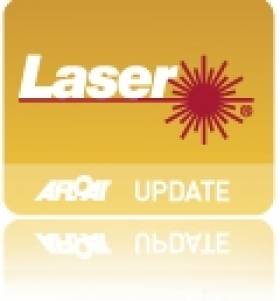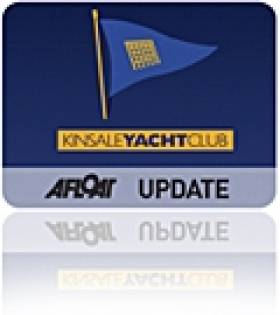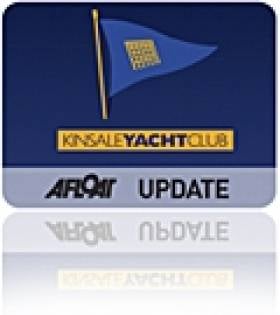Displaying items by tag: Cian Byrne
#lasersailing – After three days of strong winds, the final day of the Zhik Laser National Championships was always forecast for light breeze before strengthening in the afternoon writes Mark Mackey. Race Officer Robin Gray attempted several early starts but the wind kept shifting from side to side and it was early afternoon before things settled down. It meant there was time for only one race as an early time limit jad been agreed so that people could get home.
James Espey again took the lead on the downwind in the Standards and led the way home. Fionn Lyden eventually overtook Finn Lynch in a close battle to take second place and also second place overall. Finn had to settle for third overall though also added 1st Irish Laser Youth to the World Under 19 title won two weeks ago. This was James Espey's fifth Irish National title matching the record of Bill O'Hara. Bill was also competing here coming 14th (3rd Master), before flying off tomorrow or get ready as Race Officer for the upcoming Volvo Round the World Race. Thomas Chaix was first Master.
In the Radial class, Cian Byrne won the final race from Annalise Murphy and with it second place overall. Annalise won overall (her second Nationals title) and was 1st Lady. Liam Glynn had been leading Cian overall coming into today although only by one point. Unfortunately a bad start and an early yellow flag for body pumping put paid to any chances of Liam catching Cian. Ross O'Sullivan had another consistent day to take 4th overall.
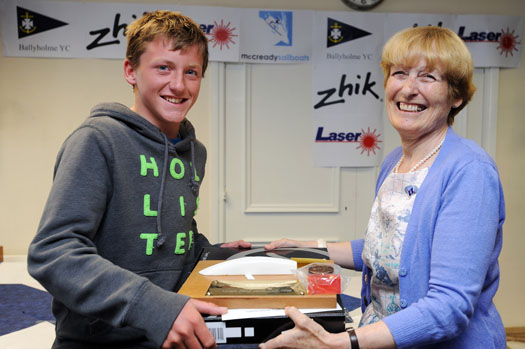
4.7 winner Johnny Durcan
Johnny Durcan continued to show his great form at the top of the Laser 4.7 fleet adding a second to his tally, finishing with only eight net points overall and ten points ahead of his nearest rival Rory Fekkes. Rory Caslin won the final race but this was still only good enough for 3rd overall with Scott Levie in 4th.
Ron Hutchieson was given a special award at the prize giving for 35 years of continuous service to the Laser class by event organiser Paddy Brow and ILA's Colin Leonard. Many thanks were given to the Race Officer Robin Gray, safety lead Ruth Mullan and the many volunteers for another great event.
Standard
1st James Espey Ballyholme YC/ RUYC (1),1,1,1,1,1
2nd Fionn Lyden Schull SC 2,(6),3,2,3,2
3rd Finn Lynch (1st Youth) National YC 3,2,(6),3,2,3
4th Darragh O'Sullivan Kinsale YC 7,5,2,4,4,(8)
5th Colin Leonard Ballyholme YC 4,3,4,6,(8),5
11th Thomas Chaix (1st Master) Kinsale YC 12,12,(13),7,13,12
Radial
1st Annalise Murphy (1st Lady) National YC 1,1,1,2,(3),2
2nd Cian Byrne Royal Cork YC 2,6,6,1,(7),1
3rd Liam Glynn Ballyholme YC (6),4,5,3,2,22
4th Ross O'Sullivan Kinsale YC (16),5,3,4,4,5
5th Conor O'Beirne Royal St George (11),7,2,7,5
4.7
1st Johnny Durcan Royal Cork YC 2,1,1,(13),2,2
2nd Rory Fekkes Ballyholme YC (8),2,4,1,4,7
3rd Rory Caslin National YC (9),4,2,4,8,1
4th Scott Levie Lough Derg YC 1,9,9,11,(40 BFD),3
5th Conor Sherriff Courtown SC 5,8,3,15,6,(16)
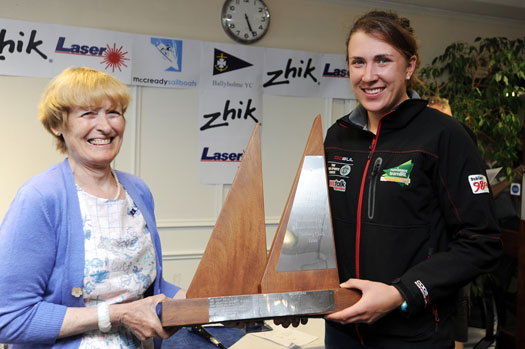
Annalise Murphy, Radial winner
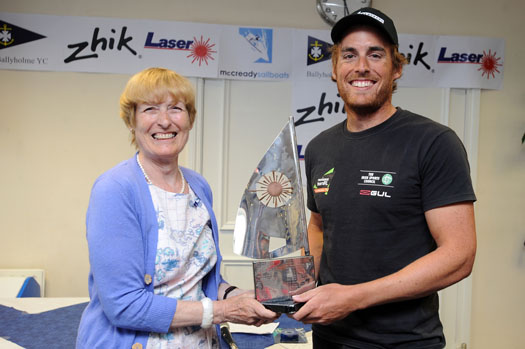
James Espey, Standard winner
Thirty Enjoy Kinsale's Frostbite Finale
Conditions for the final day of the ASM-Marine Frostbite League at Kinsale Yacht Club on Sunday could not have been a more inviting finale for the thirty plus sailors competing in the Laser, Squib and Mixed Dinghy Fleets. Despite losing two of the six week series due to the weather, the last day of the season brought welcome sunshine accompanied by a fresh Force 4 North to North-Westerly breeze, gusting Force 5 at times. Three windward-leeward races were completed which brought the total race number to eleven, with two discards applying. The constantly shifting Northerly breeze, which tracked slowly westwards was the predominate feature in all three races, with an ebb tide having effect to the right hand side of the coarse.
Dara O'Shea (KYC) with another gritty performance in the Laser 4.7 fleet, managed this week to overhaul the league leader Cian Byrne (KYC/RCYC). Leaving it to the final race and with both sailors on nineteen points, Dara grasped the top spot as he fought off his rivals and eventually took line honours and the Laser 4.7 League title. Cian untypically finished fourth but nevertheless secured second place overall, just two points behind. Darragh O'Sullivan had an excellent day's racing with a win and two seconds which pulled him into third place overall, just ahead of Conor Murphy (KYC) who finished on the same points total but one place behind in the final race.
Proving once again that consistency is the key to success in the Frostbite League, Eoghan Cudmore (KYC) with a fifth, third and a second in the Radial Fleet managed to hold off the challenge for the top spot from last year's winner Sean Murphy (KYC) who scored two thirds and a fourth. With the second best results of the day, Colm O'Regan (KYC) scoring two seconds and a fourth, moved up to third place overall. Despite an excellent run of results with three wins on the final day Thomas Chaix (KYC) with insufficient points accrued could not make an impact on the final order.
In the Laser Standard Class Rob Howe (RCYC) continued his outstanding form with a further second place and two firsts bringing his overall total to an unassailable eleven points, fourteen points ahead of his nearest rival Paul O'Sullivan of Monkstown. Scoring two thirds and a second, O'Sullivan's consistent form paid off bringing him into second place overall. David Kenefick (RCYC) who had closely pursued the leader throughout the series, dropped to third place overall as he did not compete on the day.
Seldom conceding line honours Marcus Hutchinson and Ben Fusco (KYC) in the Squib Class went into the final day leading comfortably by eight points. Two wins later and a final second easily secured the league title and are now the new holders of the Bruce Mathews Squib Trophy. In a repeat of last year Paul McCarthy (KYC) finished strongly with two seconds and a win in the final race. These results elevated him from fourth place overall into the prize winning second position. Victor Fusco and Ruth Ennis (KYC) with a final third, fourth and seventh subsequently slipped one place to claim the third prize overall.
In the Mixed Dinghy Class, despite conceding line honours in all three races Brian Jones and Gary Frost (MBSC) in their International 505 finished the series as the lead boat four points comfortably ahead. The RS Feva of David Marshall and Rob Scandrett (RCYC) closed on a high note as they took advantage with three win ASM-Marine KYC Frostbite League - Sunday 27th Feb, 2011.
Conditions for the final day of the ASM-Marine Frostbite League at Kinsale Yacht Club on Sunday could not have been a more inviting finale for the thirty plus sailors competing in the Laser, Squib and Mixed Dinghy Fleets. Despite losing two of the six week series due to the weather, the last day of the season brought welcome sunshine accompanied by a fresh Force 4 North to North-Westerly breeze, gusting Force 5 at times. Three windward-leeward races were completed which brought the total race number to eleven, with two discards applying. The constantly shifting Northerly breeze, which tracked slowly westwards was the predominate feature in all three races, with an ebb tide having effect to the right hand side of the coarse.
Dara O'Shea (KYC) with another gritty performance in the Laser 4.7 fleet, managed this week to overhaul the league leader Cian Byrne (KYC/RCYC). Leaving it to the final race and with both sailors on nineteen points, Dara grasped the top spot as he fought off his rivals and eventually took line honours and the Laser 4.7 League title. Cian untypically finished fourth but nevertheless secured second place overall, just two points behind. Darragh O'Sullivan had an excellent day's racing with a win and two seconds which pulled him into third place overall, just ahead of Conor Murphy (KYC) who finished on the same points total but one place behind in the final race.
Proving once again that consistency is the key to success in the Frostbite League, Eoghan Cudmore (KYC) with a fifth, third and a second in the Radial Fleet managed to hold off the challenge for the top spot from last year's winner Sean Murphy (KYC) who scored two thirds and a fourth. With the second best results of the day, Colm O'Regan (KYC) scoring two seconds and a fourth, moved up to third place overall. Despite an excellent run of results with three wins on the final day Thomas Chaix (KYC) with insufficient points accrued could not make an impact on the final order.
In the Laser Standard Class Rob Howe (RCYC) continued his outstanding form with a further second place and two firsts bringing his overall total to an unassailable eleven points, fourteen points ahead of his nearest rival Paul O'Sullivan of Monkstown. Scoring two thirds and a second, O'Sullivan's consistent form paid off bringing him into second place overall. David Kenefick (RCYC) who had closely pursued the leader throughout the series, dropped to third place overall as he did not compete on the day.
Seldom conceding line honours Marcus Hutchinson and Ben Fusco (KYC) in the Squib Class went into the final day leading comfortably by eight points. Two wins later and a final second easily secured the league title and are now the new holders of the Bruce Mathews Squib Trophy. In a repeat of last year Paul McCarthy (KYC) finished strongly with two seconds and a win in the final race. These results elevated him from fourth place overall into the prize winning second position. Victor Fusco and Ruth Ennis (KYC) with a final third, fourth and seventh subsequently slipped one place to claim the third prize overall.
In the Mixed Dinghy Class, despite conceding line honours in all three races Brian Jones and Gary Frost (MBSC) in their International 505 finished the series as the lead boat four points comfortably ahead. The RS Feva of David Marshall and Rob Scandrett (RCYC) closed on a high note as they took advantage with three wins and claimed the second prize overall. Finishing third on the day and third overall in the series was the Feva of Fiona Lynch and Sofie Kelleher.
At the Prize Giving, Alice Kingston KYC Commodore, congratulated the deserving winners and thanked all the sailors for their efforts. Special thanks went to PRO Bruce Mathews for his dedicated support, the Organisers, the Sponsor ASM-Marine and all those who had helped both on and off the water to make this annual event such a success. Cameron Good KYC Vice-Commodore presented the prizes and June Matthews presented the Bruce Matthews Trophies for the best performances in the Laser Radial and Squib Classes won by Eoghan Cudmore and Marcus Hutchinson respectively. The inaugural Laser 4.7 'Destiny' Trophy was presented to Dara O'Shea.
- ASMMarine
- Kinsale
- yacht
- Club
- Frostbite
- Dara O'Shea
- Cian Byrne
- Darragh O'Sullivan
- Conor Murphy
- Eoghan Cudmore
- Colm O'Regan
- Sean Murphy
- Ben Fusco
- Marcus Hutchinson
- squib
- Paul McCarthy
- Ennis
- Ruth
- Dinghy
- Cameron Good
- Ruth Ennis
- Fiona Lynch
- Sofie Kelleher
- David Marshall
- Laser
- David Kenefick
- RCYC
- Royal Cork
Keller Leads Kinsale Radials
With the predicted South-South Westerly winds arriving on schedule for the 11.55 First Gun, PRO Bruce Mathews and team laid a windward- leeward course across the harbour from Money Point to Charles Fort. The moderately difficult conditions, which were dominated by a variable force three to four, were at times exacerbated by persistent gusts sweeping the length of the course. By the end of the first race an unexpected squall left several capsized boats in its wake. With an ebb tide affecting the left side of the course in particular and strengthening as the racing progressed, the competing fleets were challenged with typical Kinsale Frostbite conditions. As five races have now been successfully completed, the first discard in the league series came into play.
First fleet off was the 4.7 Lasers, immediately followed by the combined Laser Radial and Standard rigs, and finally by the combined Squib and Mixed Dinghy classes. The slightly amended running order resulted in a quick and efficient programme which allowed for three races on the day and all crews safely ashore within three hours.
Cian Byrne (KYC/RCYC) although scoring a fourth, a third and a second in the Laser 4.7 races just managed to retain his leading position by a single point. He is closely followed by Darragh O'Sullivan (KYC) a current member of the ISA Laser 4.7 Squad, who scored a first and a fourth, while discarding an unfortunate protest-related penalty from the first week. Dara O'Shea's (KYC) overall third remains secure after scoring a fine first in the first race followed by two fourths. Séafra Guilfoyle (RCYC), another ISA Squad member, turned in the best results of the day as he scored his first points in the series with two seconds and a first in the last race.
Eoin Keller (LDYC) continued his unbeatable form in the Laser Radials, as he completed a clean sweep of all races. His unblemished record of five straight bullets puts him in a commanding position at the head of the fleet. Colm Regan, with two fourths and a second retains second place overall, as Eoghan Cudmore (RCYC/KYC) showing consistent form with two thirds and a second moves up one place to third overall.
In a much depleted Laser Standard fleet this week, Rob Howe (RCYC) took full advantage of the opportunity as he coasted home with three straight wins. His excellent performance moved him up two places to lead the field overall displacing Dave Kenefick (RCYC) who had two seconds on the day.
Marcus and Meagan Hutchinson in 'Sensation' (KYC) convincingly shot to the top of the Squib fleet, from their previous third place with three straight wins as they dominated the day's racing and went on to shake up the leader-board. Previous pace-setter Paul McCarthy in 'Mack' (KYC) having an inconsistent day, slipped down into second overall three points behind as he scored a third, a fourth, and a second in the final race. Also down one place, Victor and Ruth Fusco in 'Gemini' (KYC) scored two fourths and a seventh leaving them four points behind McCarthy. Showing much improved form, Colm Dunne and Mark Buckley (KYC) had a very successful day with a second and two thirds and moved up several places to take fourth overall.
In the Mixed Dinghy Fleet, the 505 of Brian Jones and Gary Frost (MBSC) lead the David Marshall and Rob Scandrett owned Feva (RCYC), followed by Fiona Lynch's Feva and Shane Dwyer's Topaz Uno Plus. Individual results were not available at the time of writing.
The ASM Frostbite League at KYC continues over the next two Sundays, finishing on 27th February 2011. The Sailing Instructions allow for twelve races to complete the series, with a possible three discards to apply. First Gun is at 11.55 a.m.



























